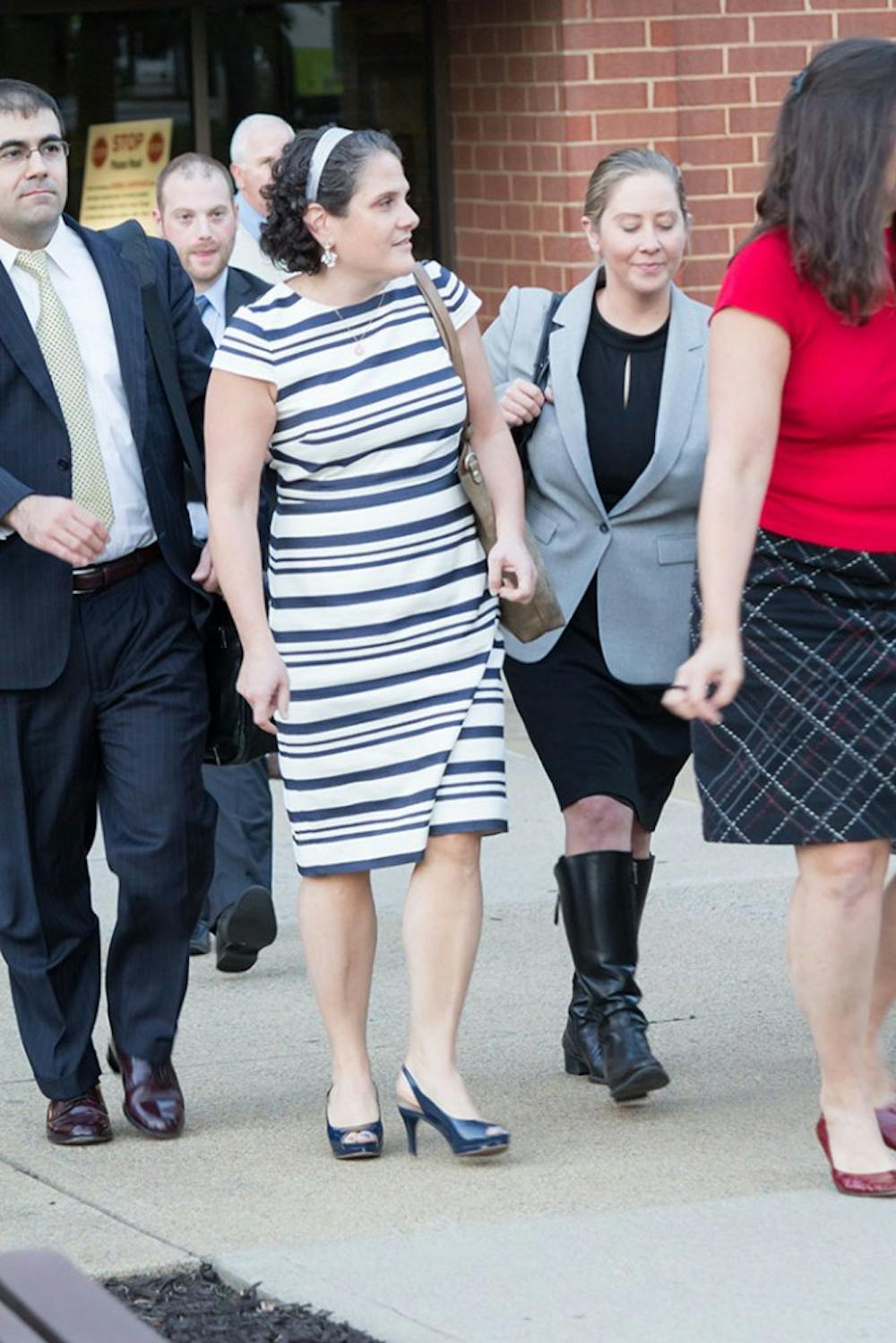Reporter Sabrina Erdely answered questions on the stand for over eight hours Thursday in the fourth day of former Associate Dean Nicole Eramo’s defamation suit against Rolling Stone magazine.
Erdely defended her reporting practices and faith in Jackie leading up to the November 2014 publication of “A Rape On Campus,” which detailed an alleged gang rape at the Phi Kappa Psi fraternity.
A subsequent Charlottesville Police Department investigation found the rape allegations to be unsubstantiated.
Eramo claims she was defamed in the article and says she was depicted as indifferent toward sexual assault victims, but Erdely maintained her criticism of the University’s sexual assault policy, which she called “victim choice” — a policy in which she says alleged victims are neutrally presented with the options like informal and formal University investigations, as well as reporting to law enforcement.
Erdely said she fears “victim choice” leads to a “coddling” — a term which she later said she regretted using — of victims and an atmosphere in which victims are not encouraged to report sexual assaults to law enforcement.
“I stand by everything in the article that did not come from Jackie,” Erdely said.
Eramo’s attorney Libby Locke questioned Erdely about discrepancies in her sourcing.
Locke noted when Jackie first spoke to Erdely, she claimed she was vaginally raped by seven men, but Jackie originally told her friends she “was forced to do oral sex.”
Even when Jackie told her friends the full details of her alleged rape, many of the stories differed from each other, Locke said. Former University student Emily Renda told Erdely “[Jackie] was gang raped by five men,” and Jackie’s friend and fellow University student Rachel Soltis told Erdely that Jackie had been raped by six men.
“I have an understanding of the trauma victim experience,” Erdely said. “Their memories come out in bits and pieces.”
Locke questioned another unverified fact of the Rolling Stone article — the scars across Jackie’s back from when she crashed through a glass table during the alleged gang rape in the Phi Kappa Psi house.
Jackie told Erdely her friends frequently asked about the scars she received on her back, but Erdely could never confirm their existence, Locke noted.
Locke cited notes from Erdely’s interviews with Soltis and Jackie’s then-boyfriend, both of whom noted never seeing the alleged scars.
“I accepted the explanation that [the scars] are faded,” Erdely said.
Locke also used the Columbia Journalism Review’s report on the Rolling Stone article to question Erdely’s reporting procedures. Locke said one of the biggest failures the CJR raised was the dialogue attributed to Jackie’s friend, Ryan Duffin, without contacting him for confirmation.
The issue of verifying quotes also came up in regards to a quote attributed to Eramo in the article, in which Eramo allegedly called the University a “rape school.”
Locke asked why Erdely did not verify the quote — which came from Jackie — with Eramo.
“U.Va. made it very clear I was not going to have access to Dean Eramo,” Erdely said.
Locke also noted that Rolling Stone did not inform readers it had no idea who “Drew” — Jackie’s alleged assailant — from the article really was or whether he even existed in the first place.
Erdely said when Jackie refused to give the full name of her alleged attacker, she was more worried about losing Jackie as a source than confirming her story with her alleged attacker.
Although Erdely said she wanted the article to be “truthful and powerful,” she also said she “had a journalistic obligation to [her] source and protecting [her].”
Erdely said she regrets placing her faith in Jackie.
“It was a mistake to rely on someone who was intent to deceive me,” she said.
Locke later asked Erdely why a reference to Eramo arranging a meeting between Jackie and police was removed from an early draft of the article.
Erdely said it was cut for length, and that her understanding of the meeting was that it dealt with an incident in which Jackie claimed she was struck with a bottle in April 2014 on the Corner as a result of comments she had made about fraternities.
Eramo’s counsel previously stated Eramo brought up Jackie’s alleged rape in those meetings with police, although Jackie declined to discuss it — an aspect that Erdely denied being aware of.
Locke also introduced audio of a dinner between Erdely, Jackie and Jackie’s friend and former University student Alex Pinkleton, in which Jackie said “We love Dean Eramo” and expressed concerns about the article impacting Eramo’s job security.
Erdely said she understood Jackie and other students she spoke with had a positive view of Eramo, but faulted Eramo for implementing a policy she believed discouraged students from going to the police with sexual assault allegations.
Locke asked Erdely about when she first started to doubt Jackie’s story, pointing to the CJR’s conclusion that Erdely was “worried about the integrity of her story” following a Nov. 26, 2014 phone conversation in which Jackie alleged her assailant was a man named James Larsen.
“I never worried about the integrity of my story,” Erdely said, refuting the CJR’s conclusion.
Erdely said although Jackie gave her a name she was unable to verify, she felt Jackie was only trying to protect herself.
Erdely said she lost faith in Jackie after a Dec. 5 phone call.
“I knew she was not being truthful with me,” Erdely said before tearfully recalling how she proceeded to email her editors to request a retraction.
Eramo’s counsel finished their cross-examination of Erdely by asking if she felt the article damaged Eramo.
Erdely said she understood Eramo suffered emotional pain, but said she felt it did not damage her career because Eramo moved into a different position and received a pay raise.
A 2015 Title IX investigation which found the University to be a “hostile environment” was more damaging to Eramo’s career, Erdely alleged.
The cross-examination ended with Erdely saying she agreed her portrayal of Eramo was fair and accurate.
Correction: a previous version of this article said Eramo's counsel "testified" Eramo brought up Jackie's alleged rape with police. Her counsel did not testify in this case, but rather made this statement during questioning.







